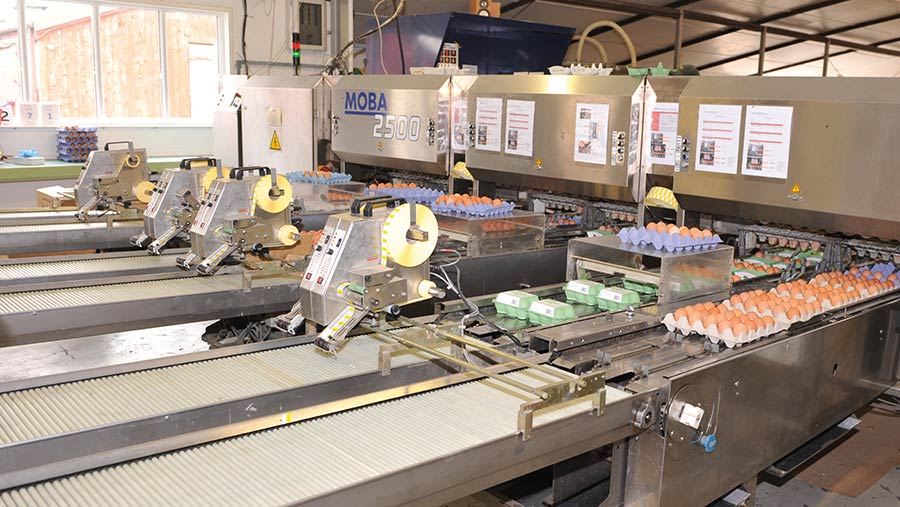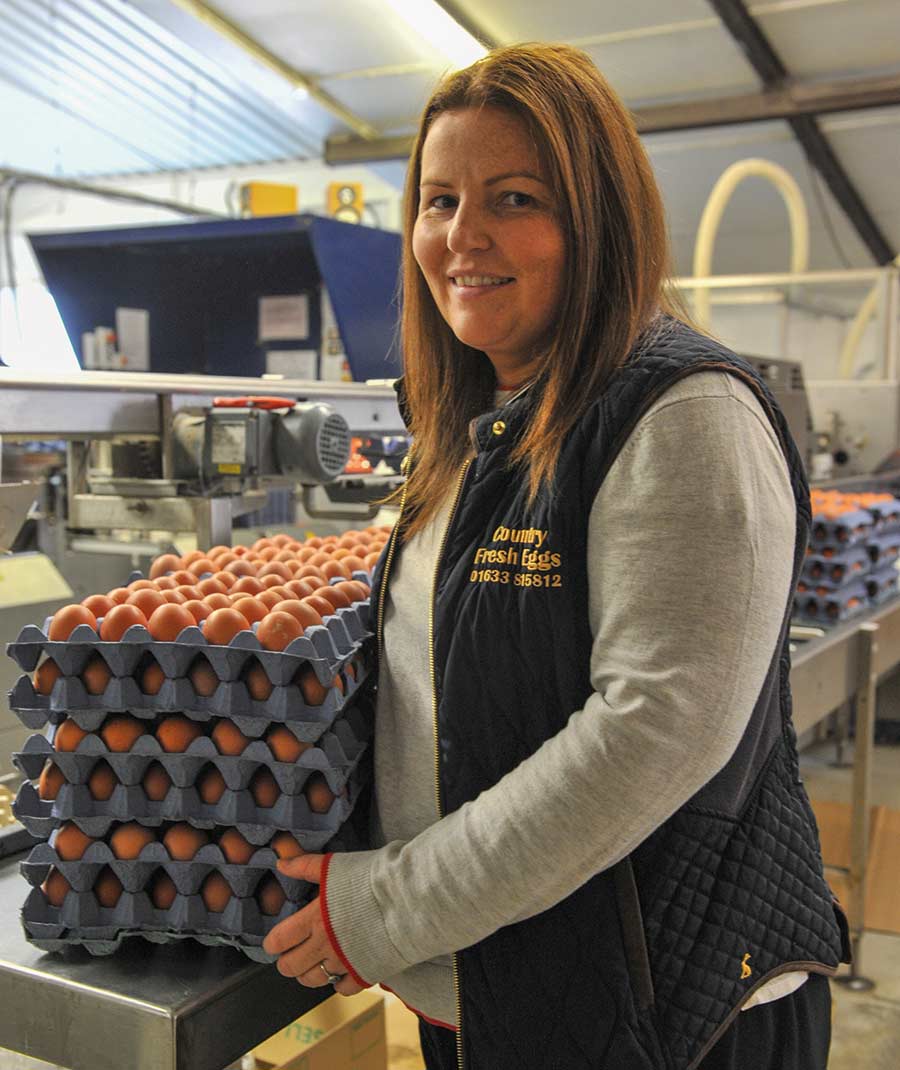How a free-range egg producer expanded local direct sales
 © Debbie James
© Debbie James Direct sales have been the business model at Ty Mawr Farm, Monmouthshire, since egg production was first established at the farm. Sixty years on, and the Country Fresh Eggs enterprise has scaled up significantly.
Victoria Shervington-Jones, whose father David set up the business, now sells 231,000 eggs a week to 700 retailers, restaurants, wholesalers and hotels, including the five-star Celtic Manor Hotel.
The remaining 154,000 are sold to Tesco to supply its Welsh stores.
See also: How an organic egg producer eliminated nuisance flies in sheds
Farm facts: Ty Mawr Farm, Monmouthshire
- Two purpose-built, flat-deck poultry sheds – one for 12,000 hens and the other for 16,000
- 11,000-hen unit converted from a redundant cattle shed
- Destocking at 76 weeks
Marketing know-how
Taking production in-house requires farmers to be more than just experts in egg production, says Mrs Shervington-Jones.
As well as requiring substantial capital investment in the resources needed to take processing in-house, producers must also become adept at marketing, selling and logistics.
Mrs Shervington-Jones spends a lot of time on the phone, attempting to win new business and ensuring that existing customers are happy.
She is also very active on social media, and visits schools and attends events to educate schoolchildren and members of the public about free-range egg production.
At Ty Mawr, a 73ha farm in the village of St Brides, Newport, Mrs Shervington-Jones runs a flock of 39,500 hens. She also produces eggs from another 20,000 hens on contract for another farmer.
Eggs are packed on the farm and there are three vans to make the deliveries on a route that stretches from Bristol to Neath.
“Direct sales is about cutting out the middleman, squeezing a bit more profit from what we do, and also reducing food miles,” says Mrs Shervington-Jones.
Her late father established a loyal customer base by knocking on doors, and she has built on that since coming home to farm.
Pricing strategy
The market is very competitive. “Ninety percent of our customers are very loyal and stick with us, but there are customers who will bounce back and forward chasing the price,” she says.
The standard price currently charged is £2/doz delivered, but the price varies from £1.50-£2.50/doz depending on the quantity bought.
Eggs are sold pre-packed in branded boxes for retail customers or in trays for restaurants and hotels.
Infrastructure investment
The egg grading and packing process was revolutionised in 2005 when the business invested £250,000 in a Moba 2500 Egg Grader, which loads, grades and packs in one continuous process. This purchase was 40% funded by a Welsh government grant.
There was further investment in 2016 when a £20,000 egg-packing machine was installed, reducing grading and packing from a full day to just two hours.
Auditing and inspections
Eggs are stamped with the farm’s identification number before they leave the laying shed, and are again stamped with that ID when they are packed; the British Lion Eggs quality-assured symbol is also added.
The auditing process is rigorous – Lion accreditation requires three annual inspections and there are numerous Welsh government visits to monitor egg quality and free-range status, says Mrs Shervington-Jones.
“We don’t have any warnings of an audit; we have to be prepared for that visit at all times.
“Our traceability is so good that I am able to tell the inspectors the exact time an egg they have bought from one of our customers went over the sorting machine.”

© Victoria Shervington- Jones
Compliance considerations
There are rigid quality controls in place, and legislative regulations that need to be complied with.
Only Class A eggs are packed and distributed to customers.
Eggs must be removed from shop shelves seven days before their best-before date expires – the best-before date must be a maximum of 28 days after the date of lay.
“I advise new clients to not buy too many until they know how they will sell,” says Mrs Shervington-Jones.
The business has an up-to-date hazard analysis critical control point (HACCP) system in place.
Voluntary participation in a HACCP-type programme reduces the risk of marketing eggs contaminated with Salmonella enteritidis and maintains consumer confidence in the product.
The poultry houses are tested for salmonella every 13 weeks and the eggs every three months.
Sales and supply
“A few of our customers used to have two deliveries a week, but we are now running weekly deliveries,” says Mrs Shervington-Jones.
The eggs are produced by Lohmann Brown hens, and more recently by Novogens.
Lohmanns are renowned for producing large eggs, but Mrs Shervington-Jones was keen to get a wider spread of egg sizes.
“Eighty percent of the eggs we sell to Tesco are large, but we wanted to also introduce a breed that would produce medium eggs to provide a bigger cross-section of sizes to supply the market.”
The birds, supplied by Shropshire-based Country Fresh Pullets, arrive at 16-weeks-old and are housed for four weeks to acclimatise to the laying, feeding and watering areas in the sheds. They are given access to the ranging area at 20 weeks.
Rejects – eggs that are pecked but without a punctured membrane – are sold to Bumblehole Foods in Birmingham, and the more damaged eggs are taken by a nearby maggot farm.
Cost pressures
With all input costs skyrocketing, from poultry feed to packaging, the business recently increased the direct sales price by 10p/doz to absorb some of this.
“Nobody batted an eyelid about that; our customers understood that our costs of production have shot up,” says Mrs Shervington-Jones.
Most customers pay on delivery, and bigger customers have a 30-day payment period.
The business employs 16 people, from packers to delivery drivers. As the cost of running the delivery vans has accelerated in recent months, changes have been made to offset some of that cost.
Mrs Shervington-Jones said she can only keep the business going at current price levels because she has no borrowings on her poultry sheds.
“My sheds are paid for, but if I was on my second or third flock and owed a lot of money to the bank I just couldn’t do that.
“We have seen so much of the margin eroded from the industry in the past five years; we need to see a 50p/doz increase just to get back to where we were then.”
Top tips for selling eggs direct
- Establish a loyal customer base
- Be reliable – customers like consistency
- Supply a quality product
